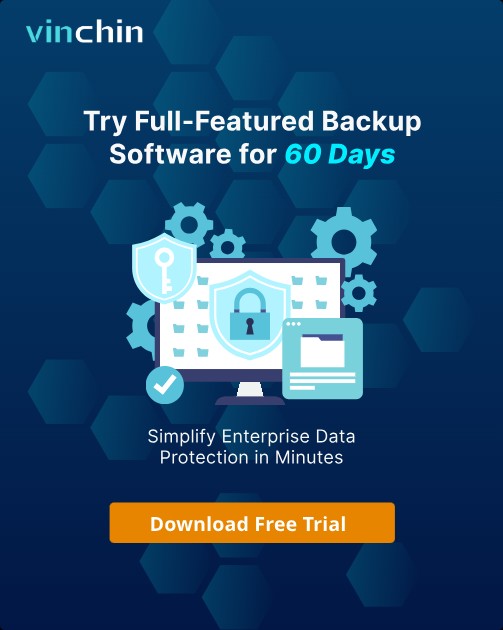-
5 Risks that threaten FusionOne Compute production environment
-
Costs of not backing up FusionOne Compute
-
FusionOne Compute backup checklist
-
The best FusionOne Compute backup software: Vinchin Backup & Recovery
-
Best FusionOne Compute backup software FAQs
-
Conclusion
If you are searching for “why backup fusionone compute,” you likely manage or support a business running critical workloads on FusionOne Compute. In today’s enterprise IT landscape, virtualization platforms like FusionOne Compute are the backbone of daily operations. Protecting these environments is not just a best practice—it is essential. This article explains why backing up FusionOne Compute is vital for business continuity, compliance, and peace of mind.
5 Risks that threaten FusionOne Compute production environment
Running FusionOne Compute in a business setting brings many benefits, but it also exposes your organization to several risks. Understanding these risks is the first step toward building a resilient IT strategy.
Ransomware attacks are a constant threat to virtual environments. Attackers target production VMs, encrypting data and demanding payment for decryption keys. Even with strong security, no system is immune to a determined attack.
Hardware failures can strike without warning. A failed disk, power supply, or network component can bring down multiple VMs at once. In a virtualized environment, a single hardware issue can have a wide impact.
Human error is another common risk. Administrators may accidentally delete or misconfigure VMs, leading to data loss or service outages. Even experienced staff can make mistakes under pressure.
Software bugs and updates sometimes introduce instability. A patch or upgrade that works in testing may cause unexpected problems in production, resulting in downtime or data corruption.
Natural disasters such as fires, floods, or earthquakes can destroy on-premises infrastructure. Without a backup, recovering lost data or services may be impossible, putting the entire business at risk.
Costs of not backing up FusionOne Compute
Failing to back up your FusionOne Compute environment can lead to data loss, which may include customer records, financial data, or intellectual property. This often results in downtime costs as critical services become unavailable, impacting productivity and revenue. Businesses may also face compliance violations if they cannot recover regulated data after an incident, leading to fines or legal action. In some cases, the inability to restore operations quickly can damage your company’s reputation and erode customer trust. For example, if a ransomware attack encrypts your FusionOne Compute VMs and you have no backup, you may be forced to pay a ransom or lose access to vital business information forever.
FusionOne Compute backup checklist
To protect enterprise workloads on FusionOne Compute, follow a set of best practices that ensure your backups are reliable and secure.
Regular scheduling is crucial. Set up automated daily, weekly, or monthly backups to capture all recent changes. This reduces the risk of losing important data between backup cycles and ensures you always have a recent restore point.
Offsite storage is another key practice. Store backup copies in a separate physical location or in the cloud. This protects your data from local disasters and allows for recovery even if your main site is compromised.
Encryption should be enabled for all backup data, both in transit and at rest. This prevents unauthorized access and keeps sensitive business information safe from cybercriminals or insider threats.
Data verification is essential to confirm that your backups are complete and usable. Regularly test restore operations to make sure you can recover VMs or files when needed, avoiding surprises during a real emergency.
Granular restore capabilities allow you to recover specific files or folders from a VM backup. This saves time and resources when only a small part of your data is lost or corrupted, rather than restoring an entire virtual machine.
The best FusionOne Compute backup software: Vinchin Backup & Recovery
For organizations seeking advanced protection for their virtualized environments—including those using FusionOne Compute—Vinchin Backup & Recovery stands out as an enterprise-level solution supporting over 15 mainstream virtualization platforms such as VMware, Hyper-V, Proxmox VE, oVirt/OLVM/RHV/XCP-ng/XenServer/OpenStack/ZStack/FusionOne Compute (and more). With broad compatibility across diverse infrastructures like yours running on FusionOne Compute VMs specifically mentioned here first—Vinchin Backup & Recovery delivers robust features tailored for complex enterprise needs.
Key highlights include LAN-free backup for fast transfers without straining production networks; forever-incremental backup optimizing storage efficiency; deduplication and compression reducing costs; instant recovery minimizing downtime; granular restore enabling precise file-level recovery—all designed for operational resilience while streamlining management.
The intuitive web console makes protecting workloads straightforward:
Step 1: Select the FusionOne Compute VM to back up
Step 2: Choose the backup storage
Step 3: Configure the backup strategy
Step 4: Submit the job
Recognized globally with top ratings among enterprise users—Vinchin Backup & Recovery offers reliability trusted by thousands worldwide plus an unrestricted 60-day free trial—click download now!
Best FusionOne Compute backup software FAQs
Q1: Can Vinchin Backup & Recovery help us recover only specific files from a FusionOne Compute VM after accidental deletion?
A1: Yes, granular restore lets you recover individual files or folders without restoring the entire VM.
Q2: How does Vinchin Backup & Recovery minimize the impact of backup jobs on our production network?
A2: LAN-free backup transfers data directly over SAN, keeping production network traffic unaffected.
Q3: What if our main data center is hit by a disaster—can we restore FusionOne Compute VMs from offsite backups?
A3: Yes, offsite backup copies enable fast recovery even if your primary site is unavailable.
Q4: Is it possible to automate backup schedules for all FusionOne Compute VMs in our environment?
A4: Vinchin Backup & Recovery supports automated daily, weekly, or monthly backup scheduling.
Q5: How does Vinchin ensure our backup data is safe from ransomware attacks?
A5: Backup data is encrypted and protected from unauthorized access, reducing ransomware risks.
Q6: Can we test our backups to make sure they are valid before a real disaster occurs?
A6: Yes, Vinchin Backup & Recovery includes data verification to ensure backups are complete and restorable.
Conclusion
Backing up enterprise workloads on FusionOne Compute is essential to avoid data loss, downtime, and compliance issues. Vinchin Backup & Recovery stands out as an ideal solution for businesses seeking reliable, efficient, and secure VM protection.
Share on:








